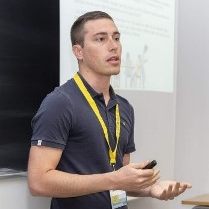Delivery Modes as for the New Ways of Teaching and Learning in Post COVID-19
A special issue of Education Sciences (ISSN 2227-7102). This special issue belongs to the section "Technology Enhanced Education".
Deadline for manuscript submissions: closed (30 September 2023) | Viewed by 15001
Special Issue Editors
Interests: online learning; computer-supported collaborative learning; technology-enhanced learning; game-based learning; ICT in education; pedagogy; inquiry learning; teacher education; teaching methods
Interests: online learning; distance learning; MOOC ICT in education; innovation in education; entrepreneurship in education; EdTech; Education 4.0
Interests: mobile learning; educational technology; ICT; teacher training; higher education teaching; pedagogy; online learning; technology enhanced learning; social networks and social applications; internet risks
Special Issues, Collections and Topics in MDPI journals
Special Issue Information
Dear Colleagues,
1) Introduction, including scientific background and highlighting the importance of this research area.
Word-widely the pandemic and the other issues such as globalization and digital development force us to re-think and develop our thoughts and ideas about learning and teaching. In the post-COVID-19 era, we need to reconsider how we define the role of education. We invite you for critical reflection and discussion of the position and the quality of Education 4.0? In what ways do we guarantee a high quality environment for learners which meets the criteria of Education 4.0. What elements and factors should we consider when designing and implementing learning and teaching environments in the post-COVID-19 era?
2) Aim of the Special Issue and how the subject relates to the journal scope.
This Special Issue provides a platform for discussion about teaching and learning in a digital age post-COVID-19. We are interested in theoretical papers exploring learning and teaching in the post-COVID-19 era and discussing future perspectives. We welcome empirical papers with novel approaches for developing learning and teaching in different educational settings as well methodological papers related to the topic are appreciated.
3) Suggest themes.
In this Special Issue, original research articles and reviews are welcome. Research areas may include (but are not limited to) the following:
- Innovative and novel pedagogical approaches and strategies and design of teaching environments;
- Learning approaches and strategies and assessment of learning, design of learning environments;
- Use of learning analytics and artificial intelligence, augmented reality, simulations, and gamification;
- Pupils’/students’ skills and knowledge, competence in the digital age;
- Educator’s professional development in different educational settings;
- Pre- and in-service teacher education;
- Innovative solutions for learning and teaching at the different educational levels.
We look forward to receiving your contributions.
References:
González-Pérez, L.I., & Ramírez-Montoya, M.S. (2022). Components of Education 4.0 in 21st Century Skills Frameworks: Systematic Review. Sustainability, 14(3),1493. https://doi.org/10.3390/su14031493
Häkkinen, P., Järvelä, S., Mäkitalo-Siegl, K., Ahonen, A. K., Näykki, P., & Valtonen, T. (2017). Preparing teacher students for twenty-first-century learning practices: a framework for enhancing collaborative problem-solving and strategic learning skills. Teachers and Teaching: Theory and Practice, 23(1), 25-41.
Iwata, M., Pitkänen, K., Laru, J., & Mäkitalo, K. (2020). Exploring Potentials and Challenges to Develop Twenty-First Century Skills and Computational Thinking in K-12 Maker Education. Frontiers in Education, 5, 87. https://doi.org/10.3389/feduc.2020.00087
Kahila, J., Valtonen, T., Tedre, M., & Mäkitalo, K. (2019). Children’s experiences on learning the 21st century skills with digital games. Games and Culture: A Journal of Interactive Media, 15(6), 685-706. https://doi.org/10.1177/1555412019845592
Miranda, J., Navarrete, C., Noguez, J. Molina-Espinosa, J.M., Ramírez-Montoya, M.S., Navarro-Tuch, S., Bustamante-Bello, M., Rosas-Fernández, J.B. & Molina, A. (2021). The core components of education 4.0 in higher education: Three case studies in engineering education. Computers & Electrical Engineering, 93. https://doi.org/10.1016/j.compeleceng.2021.107278
Ramírez-Montoya, M. S., Castillo-Martínez, I.M., Sanabria-Zepeda, J.C., & Miranda, J. (2022). Complex Thinking in the Framework of Education 4.0 and Open Innovation—A Systematic Literature Review. Journal of Open Innovation:Technology, Market, and Complexity, 8(4). https://doi.org/10.3390/joitmc8010004
Sarango-Lapo, C.P.; Mena, J. & Ramírez-Montoya, M.S. (2021). Evidence-Based Educational Innovation Model Linked to Digital Information Competence in the Framework of Education 4.0. Sustainability, 13(18), 10034. https://doi.org/10.3390/su131810034
Valtonen, T., Hoang, N., Sointu, E., Näykki, P., Virtanen, A., Pöysä-Tarhonen, J., Häkkinen, P., Järvelä, S., Mäkitalo, K., & Kukkonen, J. (2021). How pre-service teachers perceive their 21st-century skills and dispositions: A longitudinal perspective. Computers in Human Behavior, 116. https://doi.org/10.1016/j.chb.2020.106643
Aznar-Díaz, I., Hinojo-Lucena, F. J., Cáceres-Reche, M. P., & Romero-Rodríguez, J. M. (2020). Analysis of the determining factors of good teaching practices of mobile learning at the Spanish University. An explanatory model. Computers & Education, 159, 104007. https://doi.org/10.1016/j.compedu.2020.104007
Romero-Rodríguez, J. M., Aznar-Díaz, I., Hinojo-Lucena, F. J., & Cáceres-Reche, M. P. (2020). Models of good teaching practices for mobile learning in higher education. Palgrave Communications, 6(80), 1-7. https://doi.org/10.1057/s41599-020-0468-6
García-González, A., Aznar-Díaz, I., Ramírez-Montoya, M. S., & Romero-Rodríguez, J. M. (2022). Needs and expectations of university students: Learning from the impact of COVID-19 upon 9 Spanish universities. Issues in Educational Research, 31(2), 126-148. http://www.iier.org.au/iier32/garcia-gonzalez.pdf
Prof. Dr. Kati Mäkitalo
Dr. Leonardo David Glasserman-Morales
Prof. Dr. José-María Romero-Rodríguez
Guest Editors
Manuscript Submission Information
Manuscripts should be submitted online at www.mdpi.com by registering and logging in to this website. Once you are registered, click here to go to the submission form. Manuscripts can be submitted until the deadline. All submissions that pass pre-check are peer-reviewed. Accepted papers will be published continuously in the journal (as soon as accepted) and will be listed together on the special issue website. Research articles, review articles as well as short communications are invited. For planned papers, a title and short abstract (about 100 words) can be sent to the Editorial Office for announcement on this website.
Submitted manuscripts should not have been published previously, nor be under consideration for publication elsewhere (except conference proceedings papers). All manuscripts are thoroughly refereed through a double-blind peer-review process. A guide for authors and other relevant information for submission of manuscripts is available on the Instructions for Authors page. Education Sciences is an international peer-reviewed open access monthly journal published by MDPI.
Please visit the Instructions for Authors page before submitting a manuscript. The Article Processing Charge (APC) for publication in this open access journal is 1800 CHF (Swiss Francs). Submitted papers should be well formatted and use good English. Authors may use MDPI's English editing service prior to publication or during author revisions.
Keywords
- learning processes and outcomes
- teaching approaches and methods
- innovative educational practices
- learning approaches
- post COVID-19
- teacher education
- artificial intelligence/learning analytics
- gamification/simulations
- 21st century skills
Benefits of Publishing in a Special Issue
- Ease of navigation: Grouping papers by topic helps scholars navigate broad scope journals more efficiently.
- Greater discoverability: Special Issues support the reach and impact of scientific research. Articles in Special Issues are more discoverable and cited more frequently.
- Expansion of research network: Special Issues facilitate connections among authors, fostering scientific collaborations.
- External promotion: Articles in Special Issues are often promoted through the journal's social media, increasing their visibility.
- Reprint: MDPI Books provides the opportunity to republish successful Special Issues in book format, both online and in print.
Further information on MDPI's Special Issue policies can be found here.







